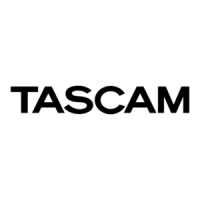4 TASCAM DM Automation Guide
1 – Introduction
The TASCAM DM-3200 and DM4800 (referred to in this manual as “TASCAM DM”) are capable of writing
and reading mix moves, as well as editing and refining mix moves during replay, all synchronized to timecode.
No external computer is necessary, as all control of the automation is made from the TASCAM DM’s control
surface.
Automated mixes are stored on the TASCAM DM’s
CF card as part of a project and can be off-loaded via
the TASCAM Mixer Companion Software to a
personal computer, as well as being easily
transported on the card between facilities equipped
with the TASCAM DM.
Here are a few reasons to use mixer automation:
• Tedious moves, (such as mutes), that occur at the
same place in the program each time can be written
to the automation system for playback. This allows
you to focus on the creative aspect of listening and
mixing, instead of the mechanical aspect of press-
ing the mute keys at the right time, every time.
• Mix moves can be refined to your satisfaction then
the automation system will read those moves back
every time in exactly the same way.
• A mix can be recalled at a later time for further
refinement.
The TASCAM DM’s automation system has been
designed to be intuitive, using the mixer’s familiar
control surface and a minimum number of key-
strokes, to stay out of the way of the creative process
of mixing.
Using This Manual
The following type conventions are used in this man-
ual:
BOLD CAPS for physical keys on the mixer’s con-
trol surface.
LIGHT CAPS
or
Light First Letter Caps
for on-screen con-
trols in the display .
First Letter Caps for names of operational modes and
functions.
Automated Controls
The following mixer controls of the TASCAM DM
can be automated:
• Fader levels
• Mutes
• Panning (including surround panning parameters,
LFE level, etc.)
• Image parameters for linked channels
• Effect settings
•
EQ settings: Gain, Frequency, Q, EQ On/Off
switching, individual EQ band switching and
TYPE switching between High/Low Pass Filter,
Peaking & Shelving
• Auxiliary send levels, Pre/Post switching and pan/
balance settings
• Auxiliary master send levels
•
COMPressor settings: threshold, ratio, attack,
release, etc.
•
GATE settings: threshold, range, hysteresis, attack,
hold, decay, etc.
• Buss and stereo buss assignments, and Aux 1-2
assignments from busses (including stereo buss)
• In surround mode, surround assignment and
assignment to center and LFE channels.
• Buss master levels
• Library recall (all libraries)
The following mixer controls of the TASCAM DM
cannot be automated:
• Digital trim (stored as part of the Initial Status,
however)
•Analog
TRIM
• Control Room monitor switching
• LCD navigation
• Transport controls
• Fader layer switching
• Global mixer setup parameters
NOTE
It is not possible to change the surround mode, group
settings, channel link settings, buss pan following ste-
reo pan setting, or pan switch settings while automa-
tion data is being replayed.
Moves for different mixer controls do not have to be
automated in the same pass. Just as in multi-track
recording, it is possible to concentrate on one spe-
cific control at a time, building up the automated mix
over a number of passes.
The TASCAM DM’s automation system allows this
to occur by intelligently switching automation modes
transparently on a per control basis.
This work done by the TASCAM DM automation
system provides a high degree of flexibility while not

